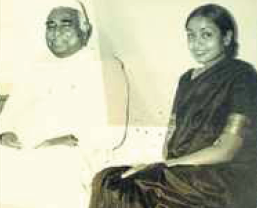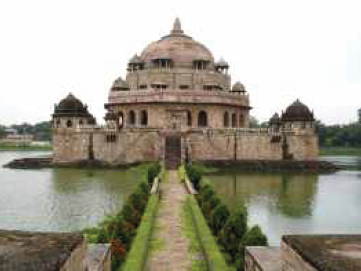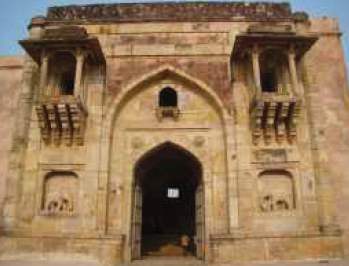Babu Jagjivan Ram
This is a collection of articles archived for the excellence of their content. Readers will be able to edit existing articles and post new articles directly |
Contents |
Babu Jagjivan Ram, Meira Kumar,
By Meira Kumar
A many Splendoured Journey
India Harmony VOLUME - 1 : ISSUE - 6 SEPTEMBER-OCTOBER, 2012
Babu Jagjivan Ram
Babu Jagjivan Ram with his indomitable will and social reformist zeal so successfully carried forward the torch of the untouchability movement started by Gandhiji.
Babuji's childhood was not as privileged as his daughter's. Son of Sobhi Ram, a soldier in the British Army, he grew up in his native village of Chandwa, Bihar. His father died early after having quit his army job in an act of rebellion, leaving the family to a life of struggle. However, Babuji did not give up his education and in 1922 joined the english medium Arrah Town School. Unfazed by caste discrimination in his school, even being made to drink water from a pot marked “untouchables”, he doggedly continues his education. However, this incident became a turning point that lit in him the lamp of determination to fight a social evil that millions like him had learned to bear over the centuries. Pandit Madan Mohan Malviya, on a visit to his school was so impressed by his passionate oratory that he invited him to join the Banaras Hindu University where he was awarded the Birla Scholarship. But his Dalit origins hounded him there too. He could not be served food in his hostel room as no attendant was ready to wash his dishes and no barber would give him a hair cut because he was an untouchable. In disgust, he left for Calcutta where he finally earned his B. Sc. Degree from Calcutta University. It was here that he organized conferences and rallies on the issue of discrimination and came to the notice of Subhash Chandra Bose. His journey as a freedom fighter, social activist and political crusader had begun. The next sixty years were to see him rise from those early troubles to the post of Deputy Prime Minister of India, a national leader who was undisputedly the most charismatic, efficient and committed leader of the backward classes. He contributed to the establishment of the “All India Depressed Classes League” and dedicated himself to attaining equality for untouchables. The rest is history. In 1985, Babuji had the satisfaction of seeing his daughter Meira Kumar take over the baton from him when she won her first election from Bijnor. It was not a cake walk. In the fray were two other young Dalit leaders, Ram Vilas Paswan and Mayawati. It was a close victory as her two rivals also scored a significant number of votes launching their careers as Dalit icons in the years to come. Much water has flown under the bridge since then. Today, what makes Meira Kumar stand head and shoulders over her two rivals in Parliament is her broad world view – a vantage point from where she can see the larger picture and perhaps showcase to the world how beautifully India has fought untouchability and given its daughters a level playing field. The cosmopolitan, multitalented Meira Kumar is the realization of the dream of India's founding fathers who enshrined social equity in the Constitution of India.
Meira Kumar
Obama's journey as a statesman and as the head of state is an inspiration for many especially those who struggle for and aspire for a life of dignity”. With these words the honourable speaker of the Lok Sabha, Smt. Meira Kumar welcomed US President Mr. Barack Obama to the Indian Parliament in November 2010. Her beautifully crafted speech made waves around the world as it articulately expressed the emotions of millions of marginalized people who looked upon Obama's election as a culmination of their aspirations for a just social order.
Meira Kumar's journey has been no less inspirational. Born into the household of Babu Jagjivan Ram, she could not but be influenced by the early struggles of her illustrious father
Born in Patna in 1945, Meira cut her political teeth as a baby. Her father, had by then become a representative of Sasaram Constituency in Bihar, a position he would continue to hold for fifty years – an unbroken record to this day.
Sasaram
Sasaram, by itself, is no ordinary district. It has been the seat of power of legendry rulers such as the Satyawadi Raja Harishchandra in the seventh century and the phenomenal Sher Shah Suri in the 15th century. Sasaram's history straddles the Ramayan period and the rule of Raja Harishchandra, whose Rohtas Fort was later rebuilt by Sher Shah Suri and is an early example of India's multiculturalism. The fort, during Sher Shah's reign continued to house the Churasan and Ganesh Temples alongside the Diwan – e – Aam and Diwan-e-Khas. Surrounded by hillocks and water falls it was an idyllic location for the seat of the Kingdom. It was here that Sher Shah Suri was born and built an empire from East Afghanistan to Bengal. This visionary Afghan ruler, in his short but eventful reign of five years was to leave a legacy that connected Kabul to North India and on to the East Coast through a paved road known as the Grand Trunk Road. His administrative skills and taxation laws were so exemplary that the Moghul and British rulers adopted them too. He lies buried in Sasaram, in a red sandstone mausoleum in the middle of an artificial lake. This grand monument built in the Indo-Afghan style has Iranian influences in its blue and yellow glazed tiles with some similarity to the Lodhi tombs. Most significantly, it's massive free standing dome also borrows from the Buddhist Stupa style of the Mauryans. It is not unlikely that Meira Kumar's early exposure to Sasaram's glorious past was to shape her multidimensional, multilingual personality in the years to come. She is fluent in Hindi, Sanskrit, Urdu, Bhojpuri, English and Spanish.
She is an accomplished markswoman, a poet in both Sanskrit and Urdu and has associated herself with conservation and heritage issues. No small wonder that the constituency that gave her a thumping victory in the last two Lok Sabha elections has full faith in her ability to once more put this landmark district on the national stage and to take it's rightful place as a symbol of India's ancient history. She, as most Biharis from Sasaram District, are the natural heirs to the legacy of Samrat Ashok whose pillar (one of the thirteen Shilalekh) is housed in a small cave in Kainur hill in Sasaram District.
Having received her university education in Delhi, Meira Kumar, a law graduate, went on to represent India as a young diplomat later joining politics at the request of Shri Rajiv Gandhi. Her charm, serenity and affability saw her sail through three elections from Karol Bagh, New Delhi and two from Sasaram, Bihar. A daughter of Bihar took on the mantle of not only her illustrious father but her equally well known mother in law Sumitra Devi, Bihar's first woman minister. Her husband, Anshul Kumar is a well-known Supreme Court lawyer who has always supported their many public obligations as heirs of Bihar's most distinguished freedom fighters and social reformers. Her performance as India's first woman speaker of the Lok Sabha has showcased her as a global Indian – a role model for young Indian women seeking to take their rightful place as confident citizens of the world's largest democracy. They stand poised to participate in world affairs representing India's unmatched ancient civilization, secure in their modernity in the footsteps of their role model Shrimati Meira Kumar.






